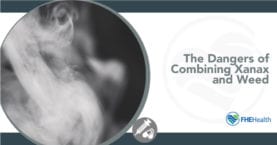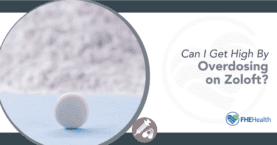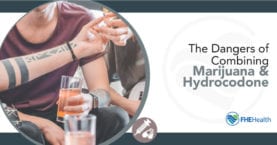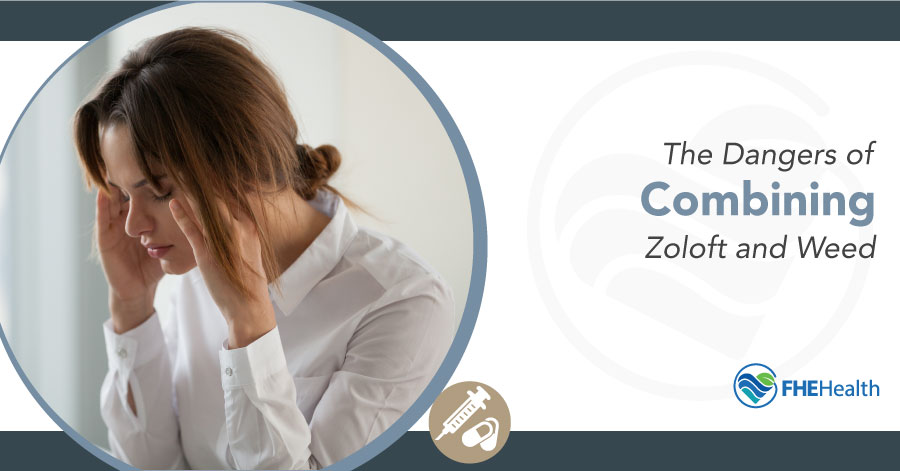
Medical professionals urge caution when combining Zoloft (sertraline) with marijuana because both substances affect the central nervous system. Drug interaction references note that using multiple psychoactive or sedating substances can increase impairment in attention, judgment, and coordination , leading to unpredictable effects.
Zoloft was the 11th most most commonly prescribed medication in the U.S. with over 42 million prescriptions in 2023. Meanwhile, marijuana use has steadily increased for both medical and recreational purposes. As the overlap grows, clinicians and drug-interaction resources have raised concerns about combining antidepressants like Zoloft with cannabis. To understand why doctors advise caution, it helps to first understand how both substance affect the user.
How Zoloft Works to Treat Depression and Anxiety
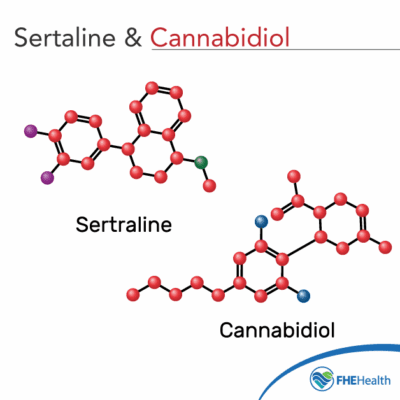 Zoloft is the brand name for sertraline, a selective serotonin reuptake inhibitor (SSRI) that increases serotonin levels in the brain. Widely prescribed since it received FDA approval in 1999, Zoloft reduces symptoms of major depressive disorder, panic disorder, obsessive-compulsive disorder (OCD), post-traumatic stress disorder (PTSD) and severe social anxiety disorder. Zoloft is even approved for treating OCD in children 6 to 17 years of age. Over 14.4% of adults aged 40–59 take antidepressants, according to the Centers for Disease Control (CDC), with sertraline being the most common antidepressant. People with depression, OCD, PTSD and anxiety disorders have abnormally low levels of serotonin due to receptors preventing the release of the neurotransmitter into the brain.
Zoloft is the brand name for sertraline, a selective serotonin reuptake inhibitor (SSRI) that increases serotonin levels in the brain. Widely prescribed since it received FDA approval in 1999, Zoloft reduces symptoms of major depressive disorder, panic disorder, obsessive-compulsive disorder (OCD), post-traumatic stress disorder (PTSD) and severe social anxiety disorder. Zoloft is even approved for treating OCD in children 6 to 17 years of age. Over 14.4% of adults aged 40–59 take antidepressants, according to the Centers for Disease Control (CDC), with sertraline being the most common antidepressant. People with depression, OCD, PTSD and anxiety disorders have abnormally low levels of serotonin due to receptors preventing the release of the neurotransmitter into the brain.
Doctors don’t fully understand all the biological factors involved in depression and anxiety, but SSRIs like Zoloft are designed to increase serotonin availability in the brain by limiting its reuptake.
Side Effects and Timeline for Relief
Zoloft doesn’t start relieving depression anxiety right away. Most people taking Zoloft report feeling better after 3 to 4 weeks of being on the drug. Initial side effects of Zoloft that usually resolve within several weeks include:
- Nausea (but not vomiting)
- Agitation (the sudden increase of serotonin can make some people feel jittery)
- Shakiness
- Insomnia or sleepiness
- Feeling tired or slightly drowsy during the day
- Feeling more anxious than usual
Risks and Warnings for Zoloft Use
Although Zoloft helps millions of people cope with depression and anxiety disorders, it can also cause serious side effects that require emergency treatment. In 2004, the FDA put warnings on all SSRIs about the risk of suicidal ideation in people taking these medicines. However, research indicates that children and adolescents are most at risk for suicidal thoughts due to “peculiar responses” to antidepressants early in their treatment. There’s no definitive evidence, though, that Zoloft or other SSRIs lead some individuals to attempt suicide.
